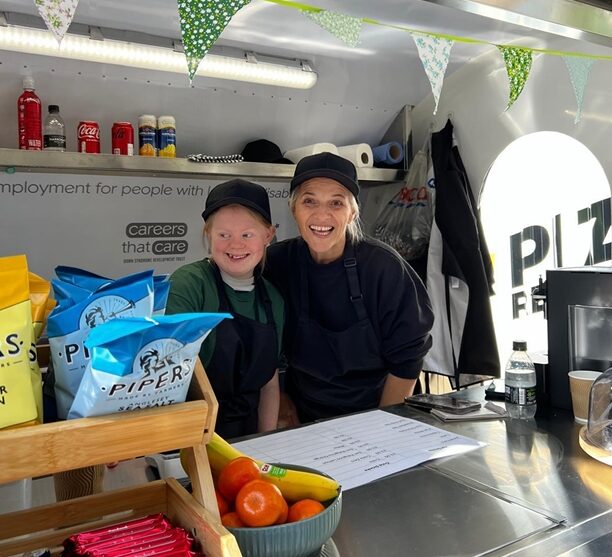At first glance, Relish appears to be just another food van on Sussex campus, parked in Library Square and serving up bagels to hungry students and staff. But behind the counter lies a story of significance: a partnership with the Down Syndrome Development Trust (DSDT) that provides young people with learning disabilities structured, supported work experience in a mainstream setting.
From Food Van to Training Ground
Relish launched in 2024 as a collaboration between DSDT, Sussex Uni Food, and the Sussex Innovation Centre. Its mission is straightforward but urgent: to offer real-world employment opportunities to 16–25-year-olds with learning disabilities, bridging a gap that remains stubbornly wide in the UK job market.
Participants rotate through various roles, including serving customers, preparing food, handling money, and stocking supplies. Each task builds practical skills, but also confidence, independence, and the kind of experience that makes future employment a possibility.
Nicki, who works closely with the project, described Relish’s purpose simply:
“Relish has been set up to support young people to gain work experience, gather customer service and skills that are required – preparing food, following health regulations. It makes such a difference for them. Some used to be uncomfortable using their voices, but here they grow in confidence and really come alive when they come into work.”

Photo: Down Syndrome Development Trust
The Numbers Behind the Need
The reality the van addresses is stark. According to Scope, only 53.6% of disabled people are in work, compared to 82.5% of non-disabled people. Furthermore, the Commons Work and Pensions Committee launched an inquiry this summer to explore solutions for the disability employment gap, highlighting that disabled people enter the workforce at only a third the rate of non-disabled people and leave at twice the rate.
This isn’t just about ability; barriers include inaccessible recruitment processes, limited opportunities for supported placements, and persistent stereotypes about what people with learning disabilities can achieve. By the time young people leave education, they’re already at a disadvantage in the job market.
A Bagel with Bigger Questions
Relish will not close the disability employment gap on its own. But its value lies in what it demonstrates: that supported employment can be integrated into everyday community settings, with benefits for both participants and the wider public.
Universities and colleges, with their diverse populations and built-in customer base, may be particularly well-placed to host projects like this. They can model inclusion in ways that are visible, practical, and grounded in everyday life.
At Sussex, Relish has become a regular part of campus life. For students, it’s a place to grab a bite to eat. For the young people working there, it’s a step towards independence. For the wider community, it leaves a pressing question: if a bagel van can make space for inclusion, why can’t more of the job market?
Another article you may enjoy: https://thebadgeronline.com/2025/10/memorial-children-of-gaza/

